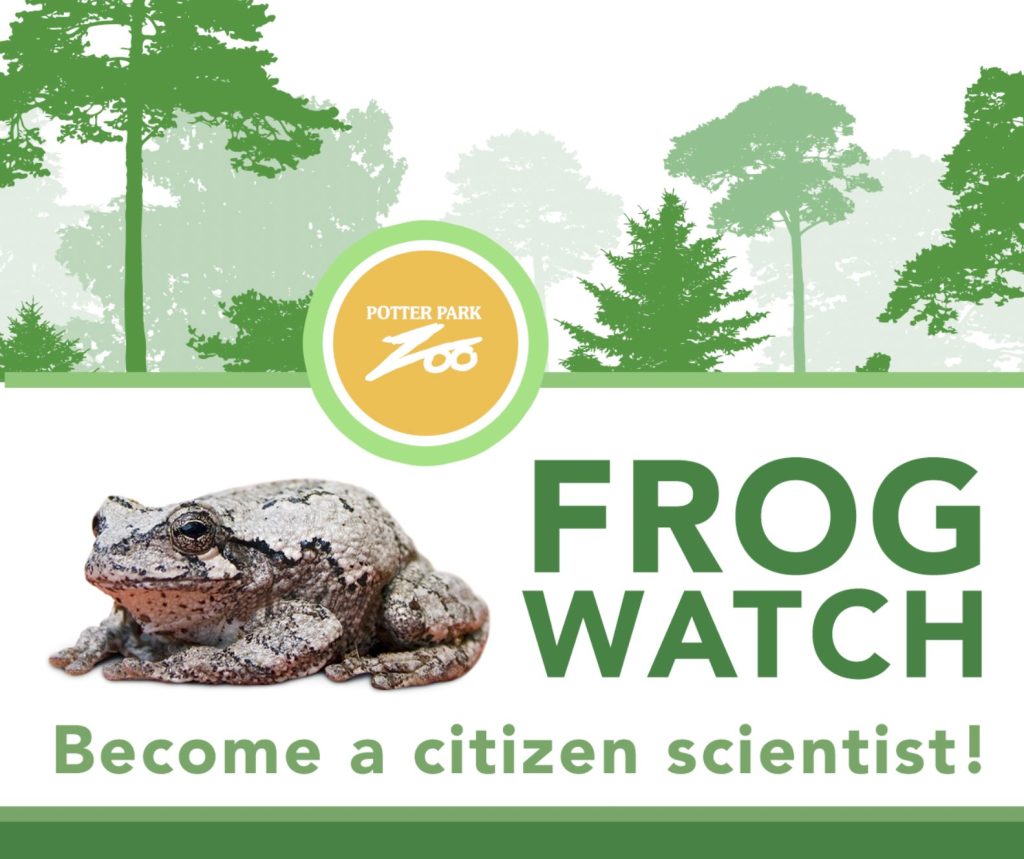Summary of Become a Citizen Scientist: 2024 FrogWatch Training Sessions at Potter Park Zoo:
The Potter Park Zoo calls Michigan residents to join FrogWatch USA as volunteer citizen scientists. Participants will contribute to understanding the decline of amphibians, particularly anurans (frogs and toads), which comprise about 90% of amphibian species and are crucial for indicating environmental health. Volunteers will learn about wetlands, how to identify different frog and toad species by their breeding calls and submit their observations to a national database. This program is open to anyone interested in amphibians who can attend two required training sessions and who commits to monitoring a local wetland site during the breeding season from April to August. Training sessions for 2024 are scheduled for late March and early April, with options to join via Zoom or in person at the zoo. Interested individuals can sign up and contact sfoote@ingham.org for more information.
– The critical role of amphibians in ecosystems and their status as indicators of environmental health
– An introduction to FrogWatch USA at Potter Park Zoo and how it empowers citizen scientists
– Detailed overview of 2024 FrogWatch training sessions, including requirements and schedules
– The practical benefits of participating in FrogWatch USA and contributing to amphibian conservation
– Strategies for effective wildlife observation and data collection as a volunteer citizen scientist
Amphibians, particularly frogs and toads, are pivotal components of many ecosystems. Their roles range from controlling insect populations to being key prey items for various predators. However, their populations face significant global declines attributed to many factors, including habitat destruction, climate change, pollution, and disease. Their sensitivity to environmental fluctuations makes them excellent biological indicators, signaling the health of their habitats long before more visible signs of decline appear. This sensitivity underlines the urgency in monitoring and conserving these species, not only for their sake but for the planet’s overall health.
Recognizing the imperative need for widespread engagement in conservation efforts, Potter Park Zoo offers an exceptional opportunity for Michigan residents to contribute positively to conserving local amphibian populations through FrogWatch USA. This national program educates volunteers on identifying frog and toad species by their calls and gathering crucial data on these animals. Through participation, individuals gain invaluable insights into wetlands and amphibian life dynamics, contributing to a broader understanding of environmental health and the challenges facing these vital creatures.
The 2024 FrogWatch training sessions at Potter Park Zoo are designed to equip participants with the knowledge and skills necessary to monitor local amphibian populations effectively. An interest in learning about amphibian calls, a commitment to the standardized monitoring protocol, and the ability to attend both required training sessions form the foundation for successful participation in this program. The training is split into two key components: understanding amphibians and wetlands, learning to recognize native frog and toad calls, and mastering the FrogWatch USA protocol.
Participating in FrogWatch USA at Potter Park Zoo benefits the individuals involved by fostering a deeper connection with local wildlife and ecosystems. It also plays a crucial role in the conservation of amphibian species. The data collected by volunteers across the country fills significant knowledge gaps, assisting scientists and conservationists in developing strategies to mitigate the decline of these species. By contributing to a national database, citizen scientists ensure that their observations support broader conservation efforts, making a tangible difference in the global fight to preserve biodiversity.
Effective wildlife observation and data collection are central to the success of volunteer efforts in conservation programs like FrogWatch USA. Participants are trained to apply a standardized protocol, ensuring consistency and reliability in the data collected. This approach allows for accurately tracking trends in amphibian populations over time, providing essential insights into their health and the effectiveness of conservation strategies. Volunteers learn to carefully document their observations, a skill that enhances their contribution to frog and toad conservation and their overall understanding of scientific research methodologies.
Engaging in FrogWatch USA at Potter Park Zoo is an enriching experience that combines education, conservation, and community involvement. It allows individuals and families to actively participate in vital ecological research, contributing to preserving local biodiversity. Moreover, it underscores the importance of citizen science in tackling environmental challenges, demonstrating that everyone has a role to play in protecting our planet. Through such collective efforts, we can substantially impact the health of ecosystems and the survival of species that are integral to them.

